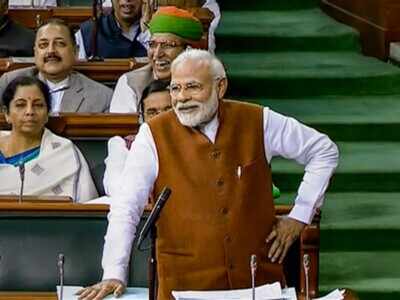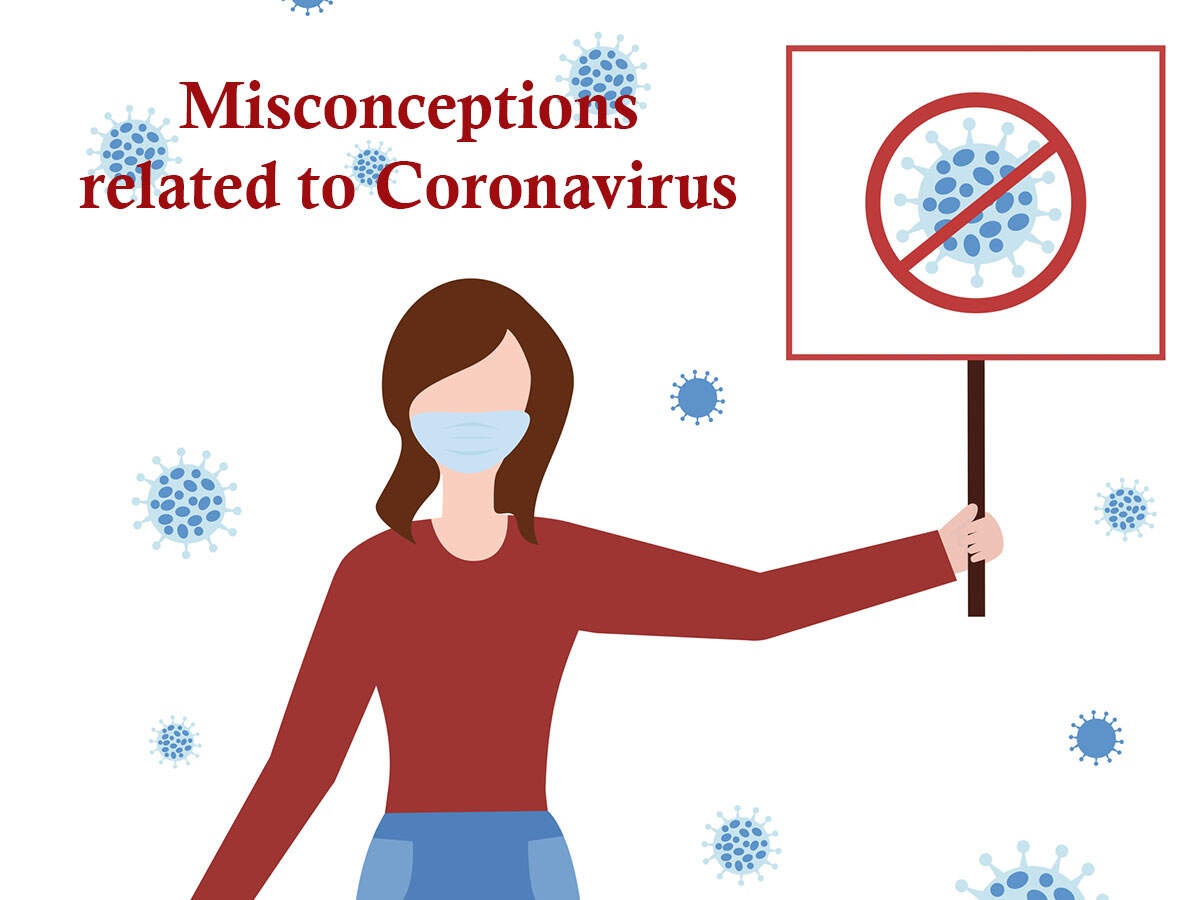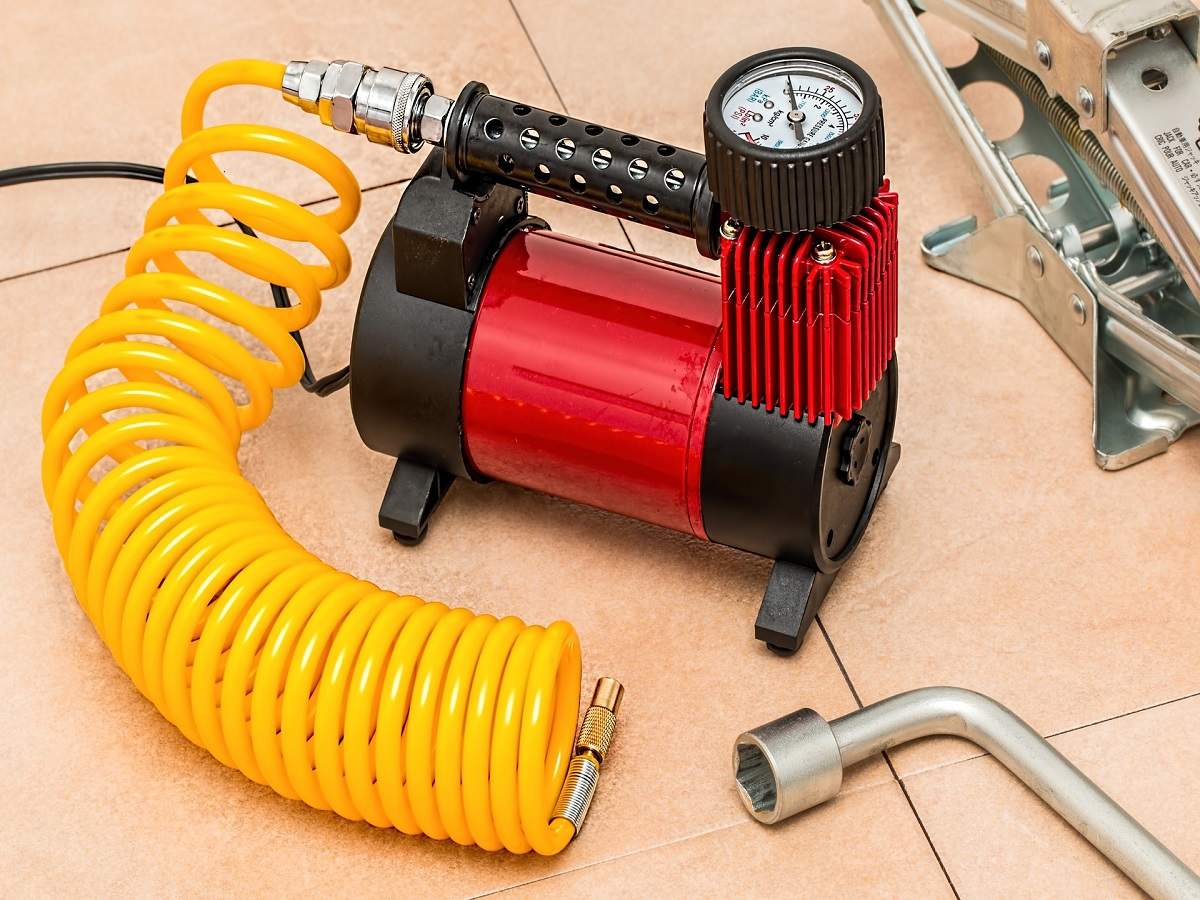
NEW DELHI: “There have been statements made by former Jammu & Kashmir chief ministers that are not acceptable to us and should bother anyone raising issues relating to the Constitution,” Prime Minister Narendra Modi said in Parliament on Thursday while replying to the debate on the motion of thanks to the President’s address.
Hours before former CMs Mehbooba Mufti and Omar Abdullah were booked under the Public Safety Act at the end of their six-month detention, Modi quoted Mufti as having said, “Humne jis desh ke saath rahne ka faisla kiya, us ne dhokha kiya hai... aisa lagta hai humne 1947 mein galat chunav kiya tha (The country with which we decided to stay has betrayed us, it seems we made a wrong choice in 1947).”
He then added, “How can someone endorse such a statement... has the Constitution deceived her?” He criticised the former CMs for remarks on scrapping the state’s special status.
Asserting that Kashmir was the “crown jewel” of India, Prime Minister Narendra Modi said, “My government has pushed development in Jammu & Kashmir. We had faith in the people of the Valley but the leaders in the state didn’t have.”
Modi said Kashmir’s identity was buried on January 19, 1990 when Kashmiri Pandits started leaving the Valley due to militancy. He said Ladakh would be developed as a carbon-neutral Union territory. Modi also said those opposing the Citizenship (Amendment) Act that seeks to provide Indian citizenship to minorities from Pakistan, Afghanistan and Bangladesh were hand in glove with the “tukde-tukde” gang.
“What Pakistan has been trying for decades, a hypothetical fear is being created by Congress... Those opposing the law are seen being clicked with the tukde-tukde gang,” the PM said. In lengthy interventions in the Lok Sabha and the Rajya Sabha, the PM countered the charge that the government is “dividing” the country with CAA, quoting Jawaharlal Nehru and Lal Bahadur Shastri to argue that a special dispensation for nonMuslims from Pakistan was acknowledged by the Congress icons.
“Was Nehru communal? Did he discriminate between Hindus and Muslims? Did he want a Hindu rashtra?” he asked. Modi said Congress’s opposition to the CAA was opportunistic and driven by “vote-bank politics”. He asked Congress if its members could be labelled “communal” for voicing concern over problems faced by minorities in Pakistan. “Why did Nehru not include all citizens but mention only religious minorities in the Nehru-Liaquat agreement,” Modi asked, and said his government was doing what India’s first PM had said decades ago.
He asserted that several reports, including those of parliamentary panels, had recommended a law like the CAA. He, however, was critical of Nehru when he said, “There is nothing wrong in having the ambition to be Prime Minister. But there was a time when because of one person’s ambition to be PM, a line was drawn that caused the Partition of India.”
The PM said Congress would always choose votebank politics to development and asked if it was unable to relate to the pain suffered by persecuted minorities in the neighbourhood. He recalled Kerala CM Pinarayi Vijayan’s remark that extremist elements may have infiltrated anti-CAA protests. Modi said if the government had followed its predecessor’s footsteps, it would never have been able to undo Article 370, pass the Enemy Property Act and bring CAA. In a strong defence of CAA and the National Population Register, he referred to Nehru’s letter to Assam’s first CM, Gopinath Bordoloi, asking him to distinguish between Hindu refugees and Muslim migrants from Pakistan.
Modi said Nehru noted that if required, the law should be amended to grant citizenship to the refugees. In the Rajya Sabha, Modi said NPR was being updated to allow rightful beneficiaries the benefit of government welfare schemes. He said NPR was first done in 2010 and updated in 2015.
“Don’t try to mislead people,” he said, asking opposition parties to not “politicise the issue”. “They are opposing (NPR) for narrow and frivolous political narrative. This is antipoor,” he said, adding his government had made productive use of data collected by the previous NPR to deliver benefits to the poor. While talking of the CAA, Modi cited the examples of Bhupendra Kumar Dutta and Jogendra Nath Mandal, two freedom fighters who stayed back in Pakistan after Partition but came to India in the face of the persecution of minorities.
“Both Dutta and Mandal came to India and died here,” he said and added, “Mandal was the first law minister of Pakistan and he too flagged systematic ethnic targeting of religious minorities in Pakistan.” The PM said in his youth, he had touched the feet of Khan Abdul Ghaffar Khan (popularly called Frontier Gandhi) and named other greats such as Ashfaqullah Khan, Begum Hazrat Mahal and A P J Abdul Kalam to assert that they were all Indians. Referring to the continuing protests, Modi warned street agitations against decisions of Parliament and state assemblies may lead to “anarchy” and should worry everyone.
He pointedly reiterated that the CAA does not affect any Indian citizen and poses no harm to minorities. “What would happen if the decisions of the Rajasthan and Madhya Pradesh assembly were opposed?” he asked. On NPR questions which have generated a controversy, Modi said this was more a governance and administrative issue and there was no sinister agenda behind it. “Since there is a lot of migration happening these days, it’s important for the government to be more aware,” he said.
The PM quoted socialist leader R M Lohia pledging support for minority communities in the neighbourhood and also recalled a late 1947 Congress Working Committee proposal calling for protection of “non-Muslims” in Pakistan. Modi also mentioned Bhimrao Ambedkar’s call to the Dalit community to come to India from Pakistan.
Hours before former CMs Mehbooba Mufti and Omar Abdullah were booked under the Public Safety Act at the end of their six-month detention, Modi quoted Mufti as having said, “Humne jis desh ke saath rahne ka faisla kiya, us ne dhokha kiya hai... aisa lagta hai humne 1947 mein galat chunav kiya tha (The country with which we decided to stay has betrayed us, it seems we made a wrong choice in 1947).”
He then added, “How can someone endorse such a statement... has the Constitution deceived her?” He criticised the former CMs for remarks on scrapping the state’s special status.
Asserting that Kashmir was the “crown jewel” of India, Prime Minister Narendra Modi said, “My government has pushed development in Jammu & Kashmir. We had faith in the people of the Valley but the leaders in the state didn’t have.”
Modi said Kashmir’s identity was buried on January 19, 1990 when Kashmiri Pandits started leaving the Valley due to militancy. He said Ladakh would be developed as a carbon-neutral Union territory. Modi also said those opposing the Citizenship (Amendment) Act that seeks to provide Indian citizenship to minorities from Pakistan, Afghanistan and Bangladesh were hand in glove with the “tukde-tukde” gang.
“What Pakistan has been trying for decades, a hypothetical fear is being created by Congress... Those opposing the law are seen being clicked with the tukde-tukde gang,” the PM said. In lengthy interventions in the Lok Sabha and the Rajya Sabha, the PM countered the charge that the government is “dividing” the country with CAA, quoting Jawaharlal Nehru and Lal Bahadur Shastri to argue that a special dispensation for nonMuslims from Pakistan was acknowledged by the Congress icons.
“Was Nehru communal? Did he discriminate between Hindus and Muslims? Did he want a Hindu rashtra?” he asked. Modi said Congress’s opposition to the CAA was opportunistic and driven by “vote-bank politics”. He asked Congress if its members could be labelled “communal” for voicing concern over problems faced by minorities in Pakistan. “Why did Nehru not include all citizens but mention only religious minorities in the Nehru-Liaquat agreement,” Modi asked, and said his government was doing what India’s first PM had said decades ago.
He asserted that several reports, including those of parliamentary panels, had recommended a law like the CAA. He, however, was critical of Nehru when he said, “There is nothing wrong in having the ambition to be Prime Minister. But there was a time when because of one person’s ambition to be PM, a line was drawn that caused the Partition of India.”
The PM said Congress would always choose votebank politics to development and asked if it was unable to relate to the pain suffered by persecuted minorities in the neighbourhood. He recalled Kerala CM Pinarayi Vijayan’s remark that extremist elements may have infiltrated anti-CAA protests. Modi said if the government had followed its predecessor’s footsteps, it would never have been able to undo Article 370, pass the Enemy Property Act and bring CAA. In a strong defence of CAA and the National Population Register, he referred to Nehru’s letter to Assam’s first CM, Gopinath Bordoloi, asking him to distinguish between Hindu refugees and Muslim migrants from Pakistan.
Modi said Nehru noted that if required, the law should be amended to grant citizenship to the refugees. In the Rajya Sabha, Modi said NPR was being updated to allow rightful beneficiaries the benefit of government welfare schemes. He said NPR was first done in 2010 and updated in 2015.
“Don’t try to mislead people,” he said, asking opposition parties to not “politicise the issue”. “They are opposing (NPR) for narrow and frivolous political narrative. This is antipoor,” he said, adding his government had made productive use of data collected by the previous NPR to deliver benefits to the poor. While talking of the CAA, Modi cited the examples of Bhupendra Kumar Dutta and Jogendra Nath Mandal, two freedom fighters who stayed back in Pakistan after Partition but came to India in the face of the persecution of minorities.
“Both Dutta and Mandal came to India and died here,” he said and added, “Mandal was the first law minister of Pakistan and he too flagged systematic ethnic targeting of religious minorities in Pakistan.” The PM said in his youth, he had touched the feet of Khan Abdul Ghaffar Khan (popularly called Frontier Gandhi) and named other greats such as Ashfaqullah Khan, Begum Hazrat Mahal and A P J Abdul Kalam to assert that they were all Indians. Referring to the continuing protests, Modi warned street agitations against decisions of Parliament and state assemblies may lead to “anarchy” and should worry everyone.
He pointedly reiterated that the CAA does not affect any Indian citizen and poses no harm to minorities. “What would happen if the decisions of the Rajasthan and Madhya Pradesh assembly were opposed?” he asked. On NPR questions which have generated a controversy, Modi said this was more a governance and administrative issue and there was no sinister agenda behind it. “Since there is a lot of migration happening these days, it’s important for the government to be more aware,” he said.
The PM quoted socialist leader R M Lohia pledging support for minority communities in the neighbourhood and also recalled a late 1947 Congress Working Committee proposal calling for protection of “non-Muslims” in Pakistan. Modi also mentioned Bhimrao Ambedkar’s call to the Dalit community to come to India from Pakistan.
Download The Times of India News App for Latest India News.
more from times of india news
Get the app









